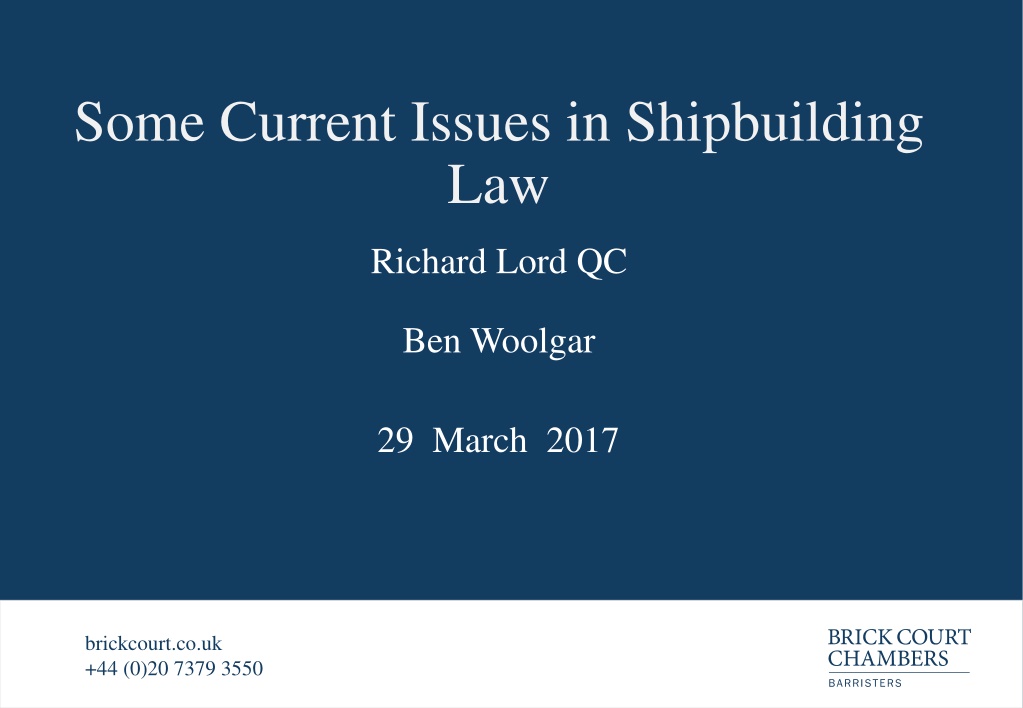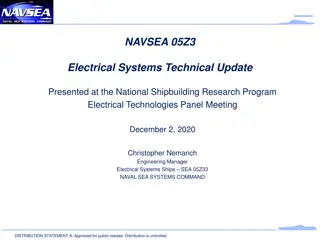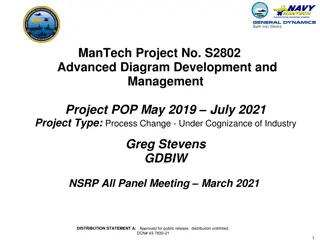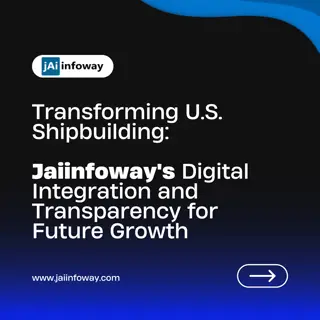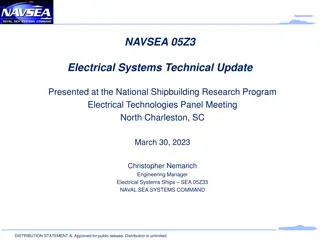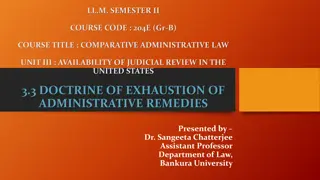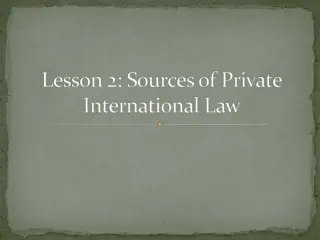Key Issues in Shipbuilding Law
The classic problem in shipbuilding law arises when a buyer seeks refunds either from the shipyard under the shipbuilding contract (SBC) or from the guarantor under a Refund Guarantee (RG), and the shipyard alleges illegality or matters contrary to public policy. The complexities of English law on illegality, including contraventions of English law, flag law, and construction location laws, are discussed in this insightful piece, addressing various fraudulent schemes and regulatory issues that may affect shipbuilding contracts.
Download Presentation

Please find below an Image/Link to download the presentation.
The content on the website is provided AS IS for your information and personal use only. It may not be sold, licensed, or shared on other websites without obtaining consent from the author. Download presentation by click this link. If you encounter any issues during the download, it is possible that the publisher has removed the file from their server.
E N D
Presentation Transcript
Some Current Issues in Shipbuilding Law Richard Lord QC Ben Woolgar 29 March 2017 brickcourt.co.uk +44 (0)20 7379 3550
Some Illegality Issues brickcourt.co.uk +44 (0)20 7379 3550
The problem The classic problem is where a buyer claims refunds either from the Yard under the shipbuilding contract ( SBC ) or from the guarantor under a Refund Guarantee ( RG ). The Builder or Yard responds with an allegation that some aspect of the SBC or its performance involves some illegality or other matter which is contrary to public policy, which, it alleges, vitiates the SBC and/or the RG brickcourt.co.uk +44 (0)20 7379 3550
What illegality may be relied upon The English law of illegality is notoriously complex and unpredictable, perhaps because of as much as in spite of the recent spate of high level decisions. Potentially relevant are contraventions of English law (as the law of the contract), the law of the flag (possibly but see Spliethoff (below) para 210) and the law where the construction takes place (Ralli Bros [1920] 1 K.B. 614). Allegations commonly include fraudulent schemes to avoid tax or duties, or infringement of foreign exchange regulations (such as the Chinese SAFE rules) Also schemes to avoid regulatory requirements which may make the process more expensive brickcourt.co.uk +44 (0)20 7379 3550
Is contravention of a law necessary ? A well known problem was the PSPC issue where contracts were backdated to avoid the need to comply with regulations increasing the cost and difficulty of painting ballast tanks. Yards alleged that such contracts were structured to deceive Class or Flag administration, relying on Alexander v Rayson and Mitsubishi v Alafouzos [1988] 1 Lloyd s Rep. 191 and irrespective of whether any law was broken. Different Tribunals have given different answers, not all following American Home Assurance v Hong Lam Marine [1999] SGCA 55 brickcourt.co.uk +44 (0)20 7379 3550
Has English law changed recently ? Does the refinement or restatement of English law by the Supreme Court in such cases as Apotex, Bilta v Nazir and Mirza v Patel made any difference ? In none of these cases was the Alexander v Rayson line of authority substantively considered In Apotex [2015] AC 430 the Supreme Court held that the public interest was not engaged in cases of torts, other than those of which dishonesty was an essential element, in breaches of contract and in statutory and other civil wrongs which offended against interests which were essentially private, such as breach of IP rights. brickcourt.co.uk +44 (0)20 7379 3550
Mirza v Patel In Mirza v Patel [2016] UKSC 42 the test was restated by a majority as whether the public interest would be harmed by enforcement of the illegal agreement In assessing whether the public interest would be harmed in that way, it is necessary (a) to consider the underlying purpose of the prohibition which has been transgressed and whether that purpose will be enhanced by denial of the claim, (b) to consider any other relevant public policy on which the denial of the claim may have an impact and (c) to consider whether denial of the claim would be a proportionate response to the illegality, bearing in mind that punishment is a matter for the criminal courts. Within that framework, various factors may be relevant, but it would be a mistake to suggest that the court is free to decide a case in an undisciplined way. The public interest is best served by a principled and transparent assessment of the considerations identified, rather by than the application of a formal approach capable of producing results which may appear arbitrary, unjust or disproportionate. (per Lord Toulson at para 120) brickcourt.co.uk +44 (0)20 7379 3550
Result in the current context ? brickcourt.co.uk +44 (0)20 7379 3550
Or perhaps look at it this way brickcourt.co.uk +44 (0)20 7379 3550
Effect on RGs Much may turn on the nature of the instrument and the much litigated question of whether it is on its true construction ondemand or primary liability on the one hand or see to it or secondary liability on the other. The cases are legion (set out in Spliethoff) perhaps divisible into three phases . brickcourt.co.uk +44 (0)20 7379 3550
Pre-Wuhan Two supposedly conflicting lines of authority On demand instrument Gold Coast v Caja de Ahorros[2002] 1 Lloyd s Rep. 717 The Paget test Where an instrument (i) relates to an underlying transaction between parties in different jurisdictions, (ii) is issued by a bank, (iii) contains an undertaking to pay "on demand" (with or without the words "first" and/or "written") and (iv) does not contain clauses excluding or limiting the defences available to a guarantor, it will almost always be construed as a demand guarantee." Instrument not from financial institution a see to it guarantee Marubeni Hong Kong v Mongolian Government [2005] 1 WLR 2497 brickcourt.co.uk +44 (0)20 7379 3550
Wuhan Guoyo v Emporiki[2014] 1 Lloyds Rep. 266 where the CA Described Christopher Clarke J. s judgment at first instance as exhausting Attempted to make it all look simple Perhaps achieved the opposite in holding the instrument (a payment guarantee) to be on demand despite there being only three of the four factors (the fourth being absent) brickcourt.co.uk +44 (0)20 7379 3550
Post Wuhan Spliethoff [2015] 2 Lloyd s Rep. 123 Extensive review of authorities in context of allegation by Yard of fraudulent scheme by Buyers and engine manufacturers to supply second hand engines Further support for the view that the fourth factor is not necessary Bitumen Invest AS v Richmond Mercantile Ltd FZC [2016] EWHC 2957. Again an on demand instrument North Shore Ventures v Anstead [2011] EWCA Civ 230 distinguished brickcourt.co.uk +44 (0)20 7379 3550
What if the RG is see to it ? As the RG liability is dependent on that of the party to the SBC (the point applied to payment guarantees as in Wuhan as well as to RGs) any illegality vitiating the SBC will prevent recovery under the RG May be separate defences (beyond the scope of this talk) under rule in Holme v Brunskill (see Spliethoff #174 and following CMIC Raffles (below)), brickcourt.co.uk +44 (0)20 7379 3550
What if the RG is on demand The conventional analysis is that as liability under the RG arises independently of the SBC, then any or illegality or other factor affecting the SBC is irrelevant. However there may be limits to this under the fourcorners doctrine (more concerned with variations than illegality) see CMIC Raffles v Schahin [2013] 2 Lloyd s Rep. 575 Also if there is a sufficient connection between RG and SBC (and of course there is always some connection) then the illegality may taint the RG see Mahonia v JP Morgan Chase BankNo. 1 [2003] 2 Lloyd s Rep. 911 and No. 2 [2004] EWHC 1938 brickcourt.co.uk +44 (0)20 7379 3550
Effect on arbitration/jurisdiction clauses In the usual way, allegations that the contract is void or unenforceable or terminated will not invalidate arbitration or jurisdiction, unless it is alleged that the arbitration clause is itself part of the illegal scheme, as in Beijing Jianlong Heavy Industry v Golden Ocean [2013] EWHC 1063 Comm (see para 14) brickcourt.co.uk +44 (0)20 7379 3550
Some issues with remedies for breach of contract brickcourt.co.uk +44 (0)20 7379 3550
Sale of Goods ? There have long been debates as to the extent to which a shipbuilding contract is one for the Sale of Goods, despite being more in the nature of a construction contract (and issues which deserve a talk on their own, as to whenthe right to reject arises). In Neon Shipping v Foreign Economic & Technical Cooperation [2016] 2 Lloyd s Rep 158 it was (eventually) common ground that SOGA 1979 applied so as to import an implied term as to fitness for purpose under section 14(3). The problem arose in the context of problems with cranes which were subject to excessive wear and could not lift their design load. brickcourt.co.uk +44 (0)20 7379 3550
Neon continued Before the Tribunal the term has been cast widely and rejected as inconsistent with the express specification, but on appeal before Burton J. there was no need to specify a particular purpose other than normal use for there to be an implied term as to fitness in line with the specification. The more interesting question concerned the relationship between this term and the express terms of the guarantee whereby Sellers guaranteed that the Vessel would be seaworthy and contractual in all respects and free from all defects due to defective design, construction..material or workmanship..for 12 months from delivery brickcourt.co.uk +44 (0)20 7379 3550
Neon continued The problem with the cranes arose more than three years after delivery. Buyers sought to contend that only claims which constituted a breach of the second part of the guarantee clause were subject to the 12 month time bar and that claims that the Vessel was not seaworthy and contractual in all respects were not caught. This contention was rejected by the Tribunal and the Judge, who considered that the (lengthy) wording of the guarantee clause as whole made it clear that it applied to all and any claims. brickcourt.co.uk +44 (0)20 7379 3550
The Star Polaris [2016] EWHC 2941 Sir Jeremy Cooke had a busy day on 17 November last year. As well as judgment in the Bitumen case, he also decided The Star Polaris, which raised an interesting issue on the meaning of a familiar phrase consequential or special losses, damages or expenses The issue arose under an SBC after the Vessel suffered a serious engine breakdown within about 6 months of delivery to Buyers. Buyers claimed for the cost of repairs and for the cost of towage and agency fees, survey fees, off-hire and off-hire bunker costs, as well as diminution in value brickcourt.co.uk +44 (0)20 7379 3550
Star Polaris (continued) The words quoted above appeared in Art IX(4) of the SBC headed extent of Builder s Liability which provided that the Builder shall have no..liability..whatsoever for.. any consequential or special losses, damages or expenses Buyers relied on a long series of authorities which established, so they contended, that these words had a specific meaning so as to exclude only losses which were not within the first limb of Hadley v Baxendale (i.e losses which do not directly and naturally arise form the ordinary course of events) thus they said, they did not exclude Buyer s claims. brickcourt.co.uk +44 (0)20 7379 3550
Star Polaris (continued) The Tribunal rejected this argument. They found as a matter of construction of Art IX as a whole that it was a completecode and that in context the words used did not have their usual meaning. Rather consequential was used in a cause and effect sense. Thus all the heads of loss were excluded. This result was upheld on appeal. brickcourt.co.uk +44 (0)20 7379 3550
Lessons from repair contracts Saga v Fincantieri [2016] EWHC 1875 (Comm) A smorgasbord of miscellaneous pointlets of interest Basic facts D agreed to repair/refurbish and overhaul specified parts of C1 s cruise ship, including work to port main engine lube oil cooler Delay in completion of works claim by C1 as owners Major breakdown of lube oil cooler various claim for damages pursued by C2 as bareboat charterer and assignee of claims from C1 brickcourt.co.uk +44 (0)20 7379 3550
Pointlets (1) Breach of contract but only in sense of failure to report on condition of cooler to enable C1 to decide what to do (# 52-56, 113) Not causative as C1 would have acted no differently even on proper advice (# 141-146) (Obiter) protocol of delivery whereby C acknowledged D s compliance with contractual obligations did not preclude a damages claims (#163-172) (Obiter) contributory negligence was in principle available in respect of a claim for failure to advise, although not for failure to effect works properly (#180-191) brickcourt.co.uk +44 (0)20 7379 3550
Pointlets (2) (Obiter) C s alternative claim under the guarantee clause was not excluded by a wear and tear provision (Obiter) C s losses were direct and so not excluded by the consequential loss exclusion (#198) (Obiter) D s argument that C2 s losses were their own and not C1 s so C2 could not recover as assignee would be rejected both on the Dunlop v Lambert grounds (#224) and on the principle (a presumption against black holes) in Offer-Hoar v Larkstore [2006] 1 WLR 2926 (#205-217) brickcourt.co.uk +44 (0)20 7379 3550
Pointlets (3) On the delay claim A finding that on a delay claim the provision for liquidated damages for delay and the provision for extensions for permissible delay had to be considered separately (#236-241) The Yard s concurrent causes defence failed, on the basis that there was no concurrent cause of delay, as relied upon by the Yard, which actually affected completion date, as required by the authorities on this issue (#24- 251) brickcourt.co.uk +44 (0)20 7379 3550
And I cannot finish without a mention of.. Teekay v STX [2017] EWHC 253 (Comm) Walker J. 416 paragraphs plus annexes Valuable analysis of when an option agreement (in a shipbuilding context) is void for uncertainty (paras 110-210 ) Answer itwas - due mainly to absence of provision for delivery date Takeaway point for practitioners how to (or not to) approach use of confidential arbitration award relevant to Court proceedings (paras 29-39, 409- 416 brickcourt.co.uk +44 (0)20 7379 3550
Total Failure of Consideration brickcourt.co.uk +44 (0)20 7379 3550
A common factual scenario Buyers and Builders enter into an SBC on the SAJ Form It provides for payment in instalments Including (usually) at least one/two before construction begins One or more instalments are paid Then one party purports to terminate brickcourt.co.uk +44 (0)20 7379 3550
The argument If Builders terminate for non-payment before work has begun, there is a total failure of consideration. Therefore: Buyers have a defence to a claim for future instalments Buyers have a claim for past instalments brickcourt.co.uk +44 (0)20 7379 3550
The issues 1. How is the contract to be construed? 2. What consideration might there be? 3. Is there a circuity of action defence? brickcourt.co.uk +44 (0)20 7379 3550
The construction issue Starting point: TFC is excluded if payments are contractually unconditional Cadogan Petroleum v Global Process Systems [2013] EWHC 214 (Comm). brickcourt.co.uk +44 (0)20 7379 3550
Hyundai v Papadopoulos [1980] 1 WLR 1129 Builders validly terminated an SBC for non-payment Then claimed an unpaid instalment Buyers defended the claim on the basis that there would be a TFC Buyers argument rejected No evidence as to whether work had been done but Lord Fraser proceeded on basis that it had brickcourt.co.uk +44 (0)20 7379 3550
Stocznia Gdanska v Latvian Shipping Co Very similar facts to Hyundai Core test is that of Lord Goff In truth the test is not whether the promisee has received a specific benefit but rather whether the promisor has performed any part of the contractual duties in respect of which payment is due brickcourt.co.uk +44 (0)20 7379 3550
The Construction Issue Importance of cash flow recognised in case law Does the SAJ Form contain an exclusive code of remedies on termination? No set-off clauses Practical implications of the rival constructions brickcourt.co.uk +44 (0)20 7379 3550
Key points Ultimately a question of construction Stocznia and Hyundai are not fatal Equally, courts and tribunals lean against such a construction The relevance of unargued points in earlier cases? brickcourt.co.uk +44 (0)20 7379 3550
What sorts of consideration might there be? brickcourt.co.uk +44 (0)20 7379 3550
Different stages of termination Ordering material Conducting design work Refund guarantees Steel-cutting : Stocznia is a clear answer brickcourt.co.uk +44 (0)20 7379 3550
Preparatory work? No binding authority But in the nature of an SBC that design/ordering will be part of the promise Distinction between ordinary contract for goods brickcourt.co.uk +44 (0)20 7379 3550
The refund guarantee issue? Typically trigger payment of instalments Essential part of the bargain? Slightly odd position brickcourt.co.uk +44 (0)20 7379 3550
Circuity of Action brickcourt.co.uk +44 (0)20 7379 3550
Short but important point Version 1: Wherever judgment for C will give D right of action to recover fruits of judgment from C Version 2: Only where the facts giving rise to the claims are identical Required as part of the TFC reasoning Will also circumvent a no set-off clause, by creating a defence rather than a counterclaim brickcourt.co.uk +44 (0)20 7379 3550
Farstad v Envirico [2010] 2 Lloyds Rep 387 The oil rig Far Service caught fire in 2002 in Peterhead Farstad (owner) sued Enviroco (contractor) Envirico had been hired by ASCO, who were charterers Farstad had agreed to indemnify ASCO for claims for loss and damage Supreme Court held that circuity of action bared Enviroco s claim for contribution brickcourt.co.uk +44 (0)20 7379 3550
Conclusion Unlikely to be any clear determination of these issues by the courts in the near future Will remain an available argument to parties in SBC disputes for some time brickcourt.co.uk +44 (0)20 7379 3550
Questions brickcourt.co.uk +44 (0)20 7379 3550
Anti-suit injunctions in a shipbuilding context Mark Davis Davis & Co 29 March 2017 brickcourt.co.uk +44 (0)20 7379 3550
Introduction Most shipbuilding contracts are subject to English law and provide for disputes to be resolved by London arbitration or the English courts. Disputes sometimes arise as to whether the buyer has a contractual right to terminate the shipbuilding contract, and consequently to claim back the advance payments. In the event that the shipyard does not refund them, a similar issue arises as to whether the buyer is entitled to make demand under the refund guarantees. Notwithstanding the parties express choice of English law and jurisdiction, the relevant shipyard may seek to invoke the assistance of local courts in an effort to obtain a more favourable outcome than may be available to it in London. brickcourt.co.uk +44 (0)20 7379 3550
Against this background it is relevant to consider in what circumstances an English court (or arbitration tribunal) will grant an anti-suit injunction to restrain the shipyard from commencing or continuing proceedings in breach of the exclusive jurisdiction or arbitration agreement. brickcourt.co.uk +44 (0)20 7379 3550
The courts jurisdiction to grant an anti-suit injunction The court has a broad discretion under Section 37 of the Senior Courts Act 1981 to grant an injunction in all cases in which it appears to the court to be just and convenient to do so. That discretion is to be exercised in accordance with the principles to be derived from a long line of authority referred to by Lord Bingham in Donohue V Armco Inc. The starting point is that where the parties have agreed that disputes should be resolved in a particular forum, effect should ordinarily be given to that agreement in the absence of strong reasons for departing from it. brickcourt.co.uk +44 (0)20 7379 3550
